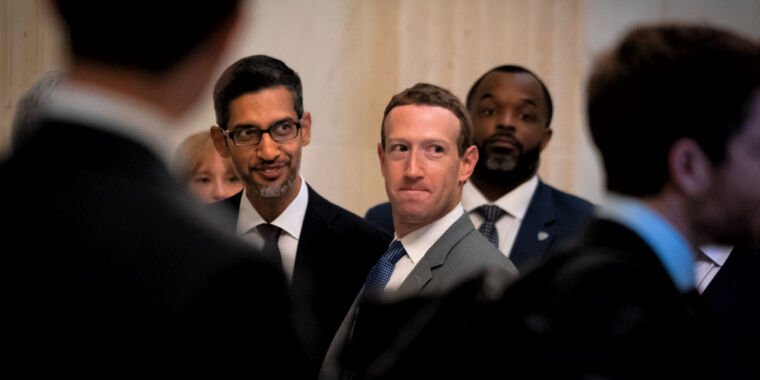U.S. Senate Majority Leader Chuck Schumer will host a closed-door artificial intelligence forum on September 13, featuring tech leaders such as Elon Musk, Mark Zuckerberg, and Sundar Pichai, to lay down a new foundation for AI policy.
Senate Majority Leader Charles E. Schumer plans to convene top tech executives, including Elon Musk, Mark Zuckerberg, and Sam Altman, for an AI policy forum in September as Congress works on legislation to address the risks of artificial intelligence.
Senate Majority Leader Chuck Schumer's upcoming AI summit in Washington D.C. will include key figures from Hollywood and Silicon Valley, indicating the growing threat that AI poses to the entertainment industry and the ongoing strikes in Hollywood. The event aims to establish a framework for regulating AI, but forming legislation will take time and involve multiple forums.
The AI Insight Forum, led by Chuck Schumer, is set to discuss artificial intelligence regulations with tech industry giants, although it has faced criticism for its exclusion of common voices; meanwhile, Google's DeepMind has launched a beta version of SynthID, a watermarking tool for identifying synthetic content in generative AI.
Mustafa Suleyman, CEO of Inflection AI, argues that restricting the sale of AI technologies and appointing a cabinet-level regulator are necessary steps to combat the negative effects of artificial intelligence and prevent misuse.
AI is being discussed by CEOs behind closed doors as a solution to various challenges, including cybersecurity, shopping efficiency, and video conferencing.
The Supreme Court's "major questions doctrine" could hinder the regulation of artificial intelligence (AI) by expert agencies, potentially freezing investments and depriving funding from AI platforms that adhere to higher standards, creating uncertainty and hindering progress in the field.
Lawmakers in the Senate Energy Committee were warned about the threats and opportunities associated with the integration of artificial intelligence (AI) into the U.S. energy sector, with a particular emphasis on the risk posed by China's AI advancements and the need for education and regulation to mitigate negative impacts.
Senators Richard Blumenthal and Josh Hawley are holding a hearing to discuss legislation on regulating artificial intelligence (AI), with a focus on protecting against potential dangers posed by AI and improving transparency and public trust in AI companies. The bipartisan legislation framework includes creating an independent oversight body, clarifying legal liability for AI harms, and requiring companies to disclose when users are interacting with AI models or systems. The hearing comes ahead of a major AI Insight Forum, where top tech executives will provide insights to all 100 senators.
Tech CEOs Elon Musk and Mark Zuckerberg will be participating in Sen. Majority Leader Chuck Schumer's first AI Insight Forum, where lawmakers will have the opportunity to hear from them about artificial intelligence.
Tesla CEO Elon Musk suggests the need for government regulation of artificial intelligence, even proposing the creation of a Department of AI, during a gathering of tech CEOs in Washington. Senate Majority Leader Chuck Schumer and other attendees also expressed the view that government should play a role in regulating AI. The options for regulation range from a standalone department to leveraging existing agencies, but the debate is expected to continue in the coming months.
CEOs from top tech companies, including Elon Musk, Mark Zuckerberg, and Sundar Pichai, met with U.S. senators to discuss artificial intelligence, with Senate Majority Leader Chuck Schumer emphasizing the need for bipartisan AI policy legislation within months rather than years.
Tech heavyweights, including Elon Musk, Mark Zuckerberg, and Sundar Pichai, expressed overwhelming consensus for the regulation of artificial intelligence during a closed-door meeting with US lawmakers convened to discuss the potential risks and benefits of AI technology.
Recent Capitol Hill activity, including proposed legislation and AI hearings, provides corporate leaders with greater clarity on the federal regulation of artificial intelligence, offering insight into potential licensing requirements, oversight, accountability, transparency, and consumer protections.
A closed-door meeting between US senators and tech industry leaders on AI regulation has sparked debate over the role of corporate leaders in policymaking.
A new poll reveals that 63% of American voters believe regulation should actively prevent the development of superintelligent AI, challenging the assumption that artificial general intelligence (AGI) should exist. The public is increasingly questioning the potential risks and costs associated with AGI, highlighting the need for democratic input and oversight in the development of transformative technologies.
Coinbase CEO Brian Armstrong argues that AI should not be regulated and instead advocates for decentralization and open-sourcing as a means to foster innovation and competition in the space.
Sen. Mark Warner, a U.S. Senator from Virginia, is urging Congress to take a less ambitious approach to regulating artificial intelligence (AI), suggesting that lawmakers should focus on narrowly focused issues rather than trying to address the full spectrum of AI risks with a single comprehensive law. Warner believes that tackling immediate concerns, such as AI-generated deepfakes, is a more realistic and effective approach to regulation. He also emphasizes the need for bipartisan agreement and action to demonstrate progress in the regulation of AI, especially given Congress's previous failures in addressing issues related to social media.
Lawmakers must adopt a nuanced understanding of AI and consider the real-world implications and consequences instead of relying on extreme speculations and the influence of corporate voices.
CEOs prioritize investments in generative AI, but there are concerns about the allocation of capital, ethical challenges, cybersecurity risks, and the lack of regulation in the AI landscape.
Artificial intelligence (AI) will surpass human intelligence and could manipulate people, according to AI pioneer Geoffrey Hinton, who quit his role at Google to raise awareness about the risks of AI and advocate for regulations. Hinton also expressed concerns about AI's impact on the labor market and its potential militaristic uses, and called for governments to commit to not building battlefield robots. Global efforts are underway to regulate AI, with the U.K. hosting a global AI summit and the U.S. crafting an AI Bill of Rights.
